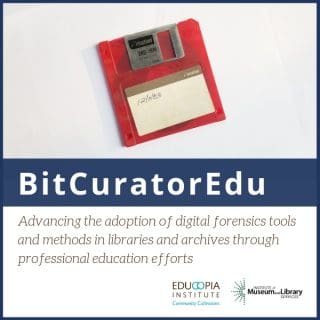
2018-2022
BitCuratorEdu
Studying and advancing the adoption of digital forensics tools and methods through professional education efforts
Quick Links to Project Deliverables:
- BitCurator Guide for Educators
- BitCuratorEdu Learning Objects
- What are the Barriers to Teaching Digital Forensics? (Blog Post)
- BitCuratorEdu Educators’ Summit
- BitCuratorEdu Workshops and Conference Presentations
About the Project:
The BitCuratorEdu project is a three-year effort funded by the Institute of Museum and Library Services (IMLS) to study and advance the adoption of digital forensics tools and methods in libraries and archives through professional education efforts. This project is a partnership between Educopia Institute and the School of Information and Library Science at the University of North Carolina at Chapel Hill, along with CoSA and several Masters-level programs in library and information science.
The project will address two main research questions:
- What are the primary institutional and technological factors that influence adoption of digital forensics tools and methods in LIS classes in different educational settings? Through interviews, surveys, and solicitation of various forms of community input, we will report on factors and implications for educational implementation strategies.
- What are the most viable mechanisms for sustaining collaboration among LIS programs on the adoption of digital forensics tools and methods? In close collaboration with the project partners, we will investigate several sustainability mechanisms. This will include, but not be limited to, potential establishment of a special educational member category within the BitCurator Consortium.
To learn more about BitCuratorEdu and explore project outputs, visit the project page on the BitCurator Consortium website: https://bitcuratorconsortium.org/bitcuratoredu/
Project Outputs:
1. Produce and disseminate a publicly accessible set of learning objects to be used by education providers in providing hands-on digital forensics education
The project made available a series of learning objects to be used by education providers in providing hands-on digital forensics education. These resources are licensed under Creative Commons Attribution 4.0 International License and are intentionally left with basic formatting and without project branding. Educators, practitioners, and students are encouraged to adapt these materials as much as needed and share them widely.
2. Investigate and report on institutional factors to facilitate, hinder and shape adoption of digital forensics educational offerings
In Spring 2020, the project team distributed a survey to educational providers in both academic and continuing education environments. The survey sought to understand current practices and ongoing challenges to developing and teaching digital forensics skills in library and information science educational offerings. They reported on their findings in the following venues:
- Jargon of/and pedagogy: BitCuratorEdu project update and brainstorming activity (BitCurator Users Forum 2020)
- What Does It Take to Teach Born-Digital Archiving and Digital Forensics? (NDSA DigiPres Conference 2021)
- What are the Barriers to Teaching Digital Forensics? (Educopia Blog)
3. Advance a community of practice around digital forensics education, though partner collaboration, wider engagement, and exploration of community sustainability mechanisms
On October 15, 2021, the BitCuratorEdu Educators’ Summit brought together digital curation practitioners, peer trainers, and graduate students with library and information science instructors from both academic programs and continuing education efforts to explore the latest topics, research and developments in digital curation education.
The BitCurator Consortium Educators Membership Working Group piloted and evaluated the feasibility of a BCC Educators Membership tier. The group piloted a set of pre-defined activities presumed to be of interest to students and educators, then made a recommendation to the BCC Executive Council about if and how to introduce a new membership option or set of benefits for educational organizations and/or educators and students as individuals.
4. Produce and disseminate a white paper on strategies for offering digital forensics education for information professionals
The BitCurator Guide for Educators is designed to provide instructors with advice, ideas, and materials to support their inclusion of digital forensics concepts, tools, and methods into courses related to the curation of born-digital materials. This Guide is intentionally geared to a broad spectrum of uses by readers with varying levels of digital forensics knowledge and technical acumen. It includes core context, as well as designs and lesson plan examples and assignments that should appeal to and provide scaffolding for different types of teaching and learning environments.